Who would be the first to squeeze last dictator’s hand?
40- 3.04.2009, 12:56
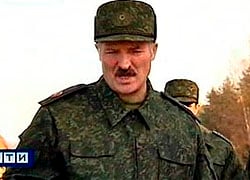
How could a ruler be invited in Prague, in whose country a vice-speaker of the parliament, an Internal Affairs Minister, a businessman and a famous journalist had been assassinated?
The international conference dedicated to the memory of the first Estonian president Lennart Meri took place in Tallinn on March 29-31 under the auspices of Estonian president Toomas Hendrik Ilves. Foreign Ministers of the European Union countries, high-ranking European officials and leading experts were taking part in the conference. At this prestigious forum Belarus was traditionally presented by the leader of the civil campaign “European Belarus” Andrei Sannikov and the leader of the civil initiative “We Remember” Iryna Krasouskaya.
 Iryna Krasouskaya told the Charter’97 press-centre about how the Belarusian question was approached at the conference in Tallinn.
Iryna Krasouskaya told the Charter’97 press-centre about how the Belarusian question was approached at the conference in Tallinn.
- Iryna, what have you discussed with the politicians you met during the conference in Tallinn?
- Above all, I wanted to get across a message that only cosmetic changes are taking place in our country, and they do not influence the situation in general. While so much attention is paid to Belarus today in Europe, a question suggests itself about conditions which the regime is to fulfill in order to become a participant of the programs offered to it. These conditions are simple: to put an end to repressions against the opposition, to alter the electoral code, to guarantee freedom of expression, to investigate cases of disappearances and assassinations of oppositional leaders and a journalist. Without fulfillment of these conditions no advances should be made to the Belarusian authorities.
- Do European officials remember that opposition leaders including your husband had been forcibly abducted and assassinated?
- Europe shouldn’t forget about that. And I am bringing up this point constantly no matter where I speak. How could a ruler be invited to Prague in whose country a former Internal Affairs Minister, a vice-speaker of the parliament, a businessman and a famous journalist had been forcibly abducted and assassinated? What could be discussed with a person when his entourage is suspected of implication in these crimes by the international community?
- To you mind, do the European politicians want to meet with the last dictator of the continent in Prague?
- Theoretically they could reason in a way that his invitation is possible, as the Eastern partnership is one of the many programs of the European Union, and everybody should be present at this summit. But when I asked participants of the conference about that directly, almost everybody said no. Nobody wants to be a whipping boy.
By the way, at the section dedicated to Eastern Partnership, Edward Lucas, a journalist who works for “The Economist” asked a simple question to its participants: “Who of you is ready to shake hands with Lukashenka?” Only 4 or 5 persons raised their hands out of 250 present! And when Lucas asked who won’t greet the Belarusians dictator in case of his arrival to Prague, there was a sea of raised hands.
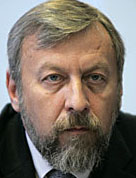 Andrei Sannikov, the leader of the civil campaign “European Belarus” has also answered the questions of the Charter’97 press-centre.
Andrei Sannikov, the leader of the civil campaign “European Belarus” has also answered the questions of the Charter’97 press-centre.
- Mr Sannikov, was the conference in Tallinn a continuation of the Brussels Forum in which you took part recently alongside with leaders of many European countries?
- As for the issue of Belarus, undoubtedly yes. Much attention had been paid to our country. The situation was discussed with hope and with great concern. The hurriedness with which European officials have made an attempt to recognize the Belarusian dictatorship is very doubtful now. More and more politicians and representatives of European structures speak about conditions under which normal relations could be based, and that the authorities of Belarus stubbornly deny to make any serious changes.
An entire section had been dedicated to Belarus; much was said about our country in the framework of discussion of the European Neighborhood policy and the Eastern Partnership program. By the way, this program was subjected to well-grounded criticism. It was said in particular by Borys Tarasyuk, chairman of the Verkhovna Rada of Ukraine’s European Integration Committee and Andrei Illarionov, a well-known Russian economist, a former economic policy advisor to the President of Russia.
Besides, lots of skeptical words about Belarus’ participation in the Eastern Partnership have been heard. I can be a witness that the understanding of those problems faced by the European Union after offering the new policy towards the Belarusian regime, is growing.
- That means that Europe comes to realize that it was too early to make Lukashenka’s Belarus a part of the Eastern partnership program?
- The original optimism of European officials which we observed, is disappearing, as they see neither serious changes in Belarus, nor a desire to carry out these changes on the part of the Belarusian authorities.
The visit of the Foreign Minister of Spain Miguel Moratinos to Belarus caused rather bewilderment than positive emotions among Europeans. Even European colleagues of Moratinos said that actions of the Spanish minister are in no way in congruence with the common agreements in the European Union. The Foreign Minister of Spain made some proposals to Belarusian authorities over the head of the Czechs, currently presiding in the EU, and the future presiding country, Sweden.
Europeans are more and more aware of the fact that Lukashenka is trying to use the new policy of the European Union towards the post-Soviet states for supporting its regime during the crisis.
- It is known that at the conference in Tallinn you met with the Foreign Minister of Sweden Carl Bildt. What the policy of the European Union could look like during this country’s presiding?
- We discussed exactly the approaches Sweden is going to realize in Belarus. In our conversations with Carl Bildt, representatives of European structures and ministries Iryna Krasouskaya and me attracted attention to the necessity to further support of rights and freedoms of Belarusians, and release of political prisoners.
In mid April a number of missions of the European Union are to visit Belarus in order to study the situation after the beginning of the new stage of the European Union policy, and to present their conclusions in Brussels. The extent and format of Belarus’ participation in the EU summit dedicated to the Eastern Partnership are to depend on these conclusions greatly.
- Do European officials know that there are political prisoners in Belarus?
- Europeans know about that undoubtedly. Some of them are trying to close their eyes to that and ignore this fact. Their argumentation rationale does not hold water. To say that one should wait for a court and only then jailed people could be or couldn’t be called political prisoners is simply absurd. I would like to remind that in line with the UN report prepared 10 years ago, independent court system does not exist in Belarus. If something has changed since then, it has changed for the worse.
- What worries the Europeans most of all today: a possible recognition of South Ossetia and Abkhazia by Lukashenka’s regime, or human rights violations in our country?
- It looks like they are more concerned by geopolitics, though it was a matter of much argument: how to maintain democratic and liberal values in Europe. It’s high time for the Europeans to understand that the issue of recognition of South Ossetia and Abkhazia won’t help to improve the situation with human rights in our country. On the contrary: the democratic processes in Belarus, respect to human rights would remove from the agenda the problem of the separatists’ recognition by our country.
- Now Europeans are deciding whether they should invite Lukashenka to Prague. To your mind, what opinion do most European politicians hold?
- The last word has not yet been said on this matter. I think that the decision would be adopted at the supreme moment. I have notices that there are personal lobbyists of the dictator in Europe, but most Europeans do not have a desire to invite Lukashenka to Prague.
A note by the Charter’97 press-centre:
The international conference dedicated to the memory of the first Estonian president Lennart Meri takes place for the third year. This year its participants included: Vice Prime Minister of the Czech Republic Alexander Vondra, Swedish Foreign Minster Carl Bildt, Foreign Minister of the Republic of Latvia Maris Riekstins, Foreign Minister of Estonia Urmas Paet, Former Deputy Assistant Secretary for European and Eurasian Affairs at the U.S. Department of State David Kramer, Defense Minister of the Netherlands Eimert van Middelkoop, Defense Minister of Georgia David Sikharulidze, deputies of the European parliament, heads of departments of the European Commission, representatives of the Council of the European Union, leading analysts from the United States, Europe and Russia.
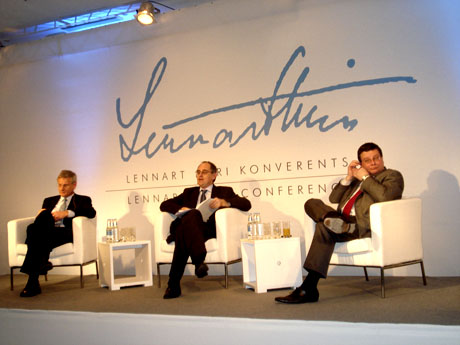
Foreign Minster of Sweden Carl Bildt, “The Economist” journalist Edward Lucas and Vice Prime Minister of the Czech Republic Alexandr Vondra
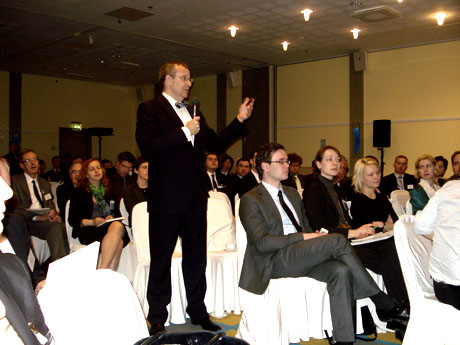
One of participants of the conference, President of Estonia Toomas Hendrik Ilves
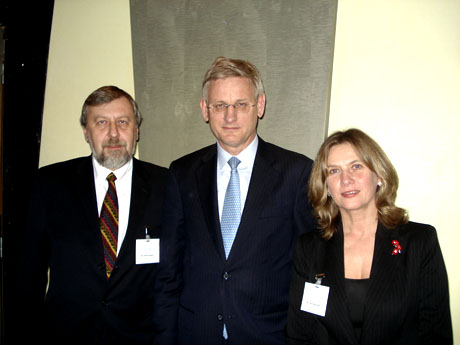
Andrei Sannikov and Iryna Krasouskaya with Carl Bildt, Minister of Foreign Affairs of Sweden










